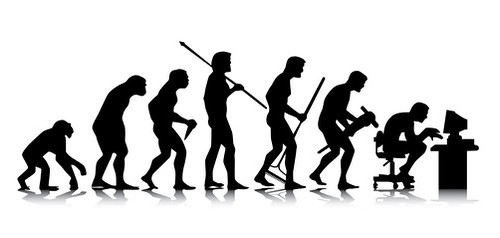One of the most fascinating articles I've read about consumer behavior in view of our evolutionary instincts: survival and reproduction. I think this articles sums up pretty well how I've always felt about consumerism and the economic systems that it drives. All systems (economic, government, religious, private enterprise ) are built on addressing, meeting, maintaining our evolutionary needs: reproduction and survival. That's why sex, food and healthcare are pretty much the biggest drivers of our economy.
- Evolutionary psychology proposes that the human mind is the product of the dual evolutionary processes of natural selection as well as sexual selection.
- Contrary to the predominant view in the social sciences, evolution does not stop at the head. Natural selection yields adaptations that confer a survival advantage (e.g., animal camouflage), while sexual selection results in adaptations that bestow a mating advantage (a peacock’s tail).
- The universal penchant for fatty foods is an adaptation to the recurring survival challenges of caloric scarcity and caloric uncertainty faced by our ancestors. It is not surprising then that the most popular restaurant chains around the world (McDonald’s, KFC, Burger King, Starbucks, Subway, Pizza Hut, Wendy’s, Taco Bell, Domino’s Pizza and Dunkin’ Donuts) share one common element: They all offer highly caloric and tasty foods that are congruent with our evolved taste buds.
- Interestingly, many cross-cultural differences in culinary traditions are also due to biological forces (see the work of Paul Sherman and his colleagues on Darwinian gastronomy). How much spices are used in a given cuisine (e.g., Thai versus Swedish), the extent of pickling that occurs (e.g., Korean kimchi), and the prevalence of meat versus vegetable dishes, are all cultural adaptations driven by a desire to minimize exposure to food pathogens.
- In life’s struggle, the first step is to survive. The next is to attract a suitable mate. It is not surprising then that many products serve as sexual signals in the mating market. It is no coincidence that men constitute the great majority of luxury car collectors (despite the fact that innumerable wealthy women could afford to own such cars). The Aston Martin is the human male version of the peacock’s tail.
- putting a man behind the wheels of a Porsche yields a drastic rise in his testosterone levels. This endocrinological reaction has been documented across numerous species that establish dominance hierarchies. In a combat between rival males, the winner will see a rise in his testosterone levels while the loser will experience a corresponding drop in his. Driving a Porsche is akin to a social victory.
- When in the fertile phase of their cycles, women are much more concerned with beautification, while when in the luteal phase (non-fertile) food assumes a more important role in their daily lives. These hormonal-based realities are equally operative for Japanese, Namibian or Bedouin women. On a related note, the evolutionary psychologist Geoffrey Miller and his colleagues have documented a correlation between the total tips garnered by female strippers and their menstrual cycle. When maximally fertile, the tips are larger.
- Harvard evolutionist E. O. Wilson, who famously asserted: “The genes hold culture on a leash. The leash is very long, but inevitably values will be constrained in accordance with their effects on the human gene pool.
- Globally, religious narratives, cosmetic companies and self-help gurus offer solace and hope to assuage the exact same set of Darwinian-based insecurities (e.g., mortality, mating concerns, parental worries, status angst).
- Nothing in consumer behavior makes sense except in the light of evolution.

No comments:
Post a Comment